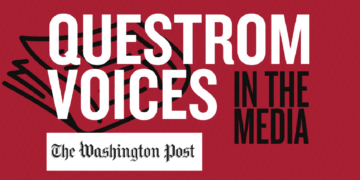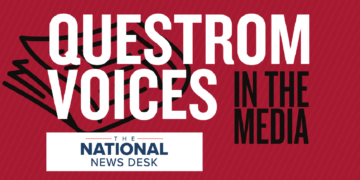This proposed change, presented in Question 1 on the Massachusetts ballot, has generated significant debate on the pros and cons of a new tax on the wealthy.
To learn more about Question 1, Questrom Insights discussed this proposal with Pete Lisowsky, Associate Professor of Accounting and Dean’s Research Scholar at the Questrom School of Business. Prof. Lisowsky has taught various tax courses at BU, MIT, and the University of Illinois, and worked at the U.S. Treasury and IRS in various research capacities for 15 years. He is currently the President of the American Taxation Association.
What is the main goal of Question 1?
Question 1 seeks to amend Article 44 of the Massachusetts Constitution to levy a new and higher tax on incomes over $1 million. The tax rate on this portion of income will be 4%. Currently Massachusetts levies a 5% tax on all income, so the combined tax rate on incomes over $1 million would become 9%.
The language of the amendment states that the funds collected from the tax will be used for public education such as schools and universities, as well as infrastructure such as roads and bridges. The exact appropriations will be left to the legislature to decide.
The $1 million threshold will be adjusted annually based on inflation, the same way the federal income tax system is adjusted annually for inflation.
If passed, the new tax would go into effect on January 1, 2023.
What are some key arguments that Proponents make in favor of Question 1?
The key argument that proponents of Question 1 make is that top earners in Massachusetts do not pay their fair share of income taxes. This argument is based on the fact that Massachusetts imposes a flat 5% tax on all income earned by Massachusetts residents. As a result, top earners pay the same proportion of their income in taxes as low earners do. This structure is different from the federal income tax structure, which is based on progressive tax rates where greater amounts of income are taxed at higher rates. For example, the lowest U.S. federal income tax rate on salaries is 10% while the highest is 37%, with 5 tax rates in-between that rise as income rises. The proposed amendment would thus align the Massachusetts tax rate structure to the federal structure and ensure that higher income earners pay more of their income in taxes than lower income earners.
Question 1 also proposes to use the new tax revenues to fund public education and physical infrastructure. These appropriations are subject to the legislative process, but as written, the amendment would likely prevent state lawmakers from using the funds for other purposes. Therefore, the added funding into public education will keep Massachusetts schools as the best in the nation.
Proponents of Question 1 believe that the change will increase annual state revenues by $2 billion. However, the Massachusetts Executive Office of Administration and Finance estimates that figure to be closer to $1.2 billion; even so, this figure represents a significant 2.4% of the current annual state budget. The Office admits, however, that the amount of taxes will vary significantly year to year and may be unpredictable, as taxpayers may also decide to relocate their home or business to another, presumably lower-tax state.
What are some key arguments that Opponents make against Question 1?
The arguments that opponents to Question 1 make is that the tax would create a combined 9% marginal tax rate in Massachusetts, which in effect is an 80% tax increase over the current 5% level. By making the top marginal tax rate 9%, Massachusetts would move from a rather lower-tax state—more than half of U.S. states have tax rates higher than Massachusetts—to the #7 highest income tax state, after New York, Oregon, California, New Jersey, Hawaii, and Minnesota.
Opponents also point out that there is no language in the amendment to ensure that certain types of income, such as those from selling a home, business, or farm, would be exempt from the 4% surtax. As a result, the surtax would bite into lifelong work to build wealth and leave less for retirement.
Furthermore, there is no guarantee that the legislature will in fact add the new tax proceeds to their current appropriations on public education and infrastructure. The danger is that lawmakers will be tempted to use the new tax revenues to substitute for the current priorities, and thus free up cash to fund yet-to-be-determined priorities.
Finally, the state currently has a surplus of over $5 billion and will be mailing $3 billion in refund checks to Massachusetts taxpayers. In addition, the state’s Stabilization Fund (i.e., rainy day fund) is almost $7 billion. The argument is that it makes no sense to increase taxes to simply add to huge surpluses that will just be returned. Instead, politicians should appropriate more of the funds that they already have for education and infrastructure, and that a new tax is not necessary in the current environment.
How do you see Question 1 being decided?
At the heart of it, Question 1 is asking Massachusetts voters to make a value judgment. On the one side, Proponents argue that the flat 5% tax rate is unfair to lower income earners, and higher income earners should pay significantly more—upwards to 80% more—than they currently do. This change is targeted at the Top 1% of taxpayers. By raising taxes on the wealthy and directing it towards schools and infrastructure, proponents argue that this amendment will build an economy that works for everyone and make our tax system fairer.
On the other side is the argument that Massachusetts already has huge multi-billion-dollar surpluses. The state is so flush with tax revenues that a sleepy old law from 1986 was automatically triggered that requires the state to send refund checks to taxpayers for their prior taxes paid. The state seems to be bringing in money faster than it can handle appropriating. Interestingly, this automatic tax refund law, now known as Chapter 62F, was passed in 1986 using a similar statewide ballot question. But different from the current ballot question, Chapter 62F is a way to cap the growth of government revenues.
I think the Proponents’ arguments, at least in the current budget environment, seem like an uphill fight. The state doesn’t appear to need more tax revenue from its citizens. If Proponents would like for lawmakers to fund more education and infrastructure projects, then it seems that a more suitable approach would be to educate the legislators on the benefits of appropriating more of the surplus and rainy day fund to meet these goals. In fact, with Maura Healey’s likely victory for Governor adding to an overwhelmingly Democratic legislature, to me these aims could very likely be accomplished absent the passage of Question 1.
So between the state already being flush with cash and a legitimate legislative process under which the funds could still be deployed for education and infrastructure, it becomes a debate between values around income inequality and values of how much government should collect in taxes from its citizens as a whole. Namely, how much is enough?
Is there a potential compromise to Question 1?
A key challenge I see with Question 1 is one of marketing around the proposed progressive tax rate structure. I would have instead proposed to keep the 5% state tax rate on incomes over $1 million intact, but create a reduced tax rate, say 3% or 4%, for taxpayers with incomes less than $1 million. In effect, my “amendment to the amendment” could engineer both a progressive income tax rate structure in Massachusetts, under which high earners do pay proportionately more than low earners, but also give a permanent tax cut to these lower-income workers.
By reducing the total state tax revenues collected from the lower income earners, this proposed structure would also prevent taxes from being refunded automatically under Chapter 62F. Interestingly, those refunds will still be going to the highest income earners, since on a nominal level, they have paid the most in taxes. Therefore, without changing Section 62F, Question 1 might not have much of a bite even if it is approved by voters and if budget surpluses continue. Section 62F might simply force the higher taxes to be returned.
Overall, by lowering the tax rate on lower and middle-class earners, they will get a meaningful tax cut, while the wealthy will continue paying their tax bills, but at the relatively higher rate. And at the state level, Massachusetts would still be able to balance its books and fund its priorities. Providing current and sustained tax relief to working class families while keeping high earners equally productive in Massachusetts is a position that, I hope, can generate some common ground.
I look forward to seeing the outcome of this ballot question and assess, regardless of the outcome, whether and how future tax policy might change in Massachusetts.


























